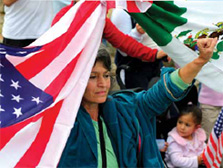FACT’s mission is empowering individuals to act together to improve their lives and revitalize democracy. Its central strategy is building the organizational strength that enables its grantees to do that work effectively over time, because change takes time. To build that strength, it chose a small number of groups and gave them annual general operating support grants, ranging from $30,000 to $175,000, with the amount based on the group’s budget size, for a total grants budget of approximately $2.8 million per year (not including family giving or overhead).
The foundation looked for strong, visionary leaders. It was also important that the group tackled multiple issues and employed a variety of strategies. “We looked for groups with a community organizing and advocacy strategy, but that also had larger goals in the state, regional and national arena,” Diane said. “These were groups that had short-term results as well as long-term strategies.”
 In 2000, five years into its grant making, FACT used an external evaluator to anonymously survey its grantees regarding FACT’s funding. Based on some of the feedback, FACT determined that its basic strategy of ongoing general operating support was correct. The foundation decided to reduce the overall number of its grantees in order to focus on about 40 groups for the long term. The majority of FACT’s grantees have thus been supported for 12, 15, or even 18 years.
In 2000, five years into its grant making, FACT used an external evaluator to anonymously survey its grantees regarding FACT’s funding. Based on some of the feedback, FACT determined that its basic strategy of ongoing general operating support was correct. The foundation decided to reduce the overall number of its grantees in order to focus on about 40 groups for the long term. The majority of FACT’s grantees have thus been supported for 12, 15, or even 18 years.
For a number of years, FACT brought its core grantees together twice a year so that they could learn from each other and to inform FACT’s grant making. FACT ended the meetings when they became redundant, but only after having helped the grantees build valuable relationships. In 2007, FACT brought together all of its grantees to announce the spend-out decision and ask for feedback on what the foundation should do before exiting the field. FACT tried hard not to overburden the grantees with meetings, but it gained valuable information from these convenings about how its funding could have more impact. Early on FACT instituted a policy of manageable reporting requirements, clear deadlines (the board met twice a year to review the docket), and prompt notifications to respect the time of the organizations’ small staffs.
FACT followed the work of grantees through site visits, frequent conversations to assess progress and discuss challenges, and detailed reports that each organization submitted at the end of the year. In addition, each year two groups were chosen for in-depth reviews of their strengths, weaknesses and accomplishments. FACT staff spoke with the executive director, board members, allies and several funders who were familiar with the work of the organization. After the review, the staff member scheduled a one-one conversation with the executive director to report what she heard and to offer assistance if needed. This process provided helpful feedback to grantees and allowed FACT to gain an in-depth knowledge of the organizations and assess their progress and impact.
Social change work tends to be long-term, nonlinear and with many actors, ups and downs, and trends that are beyond any one organization’s control. Short and long-term benchmarks to guide FACT’s internal progress included:
 Was FACT strengthening grantees through its capacity building program so they met the foundation’s criteria for effective organizations?
Was FACT strengthening grantees through its capacity building program so they met the foundation’s criteria for effective organizations?It took new groups one to five years to start to demonstrate some of the elements that FACT looked for as indicators of success; hence, the long-term funding. For already established groups, FACT expected to see some short-term goals achieved within two to three years. If no progress was made within that time, FACT began to investigate whether to help the group or stop funding it. The foundation did stop funding groups if they no longer were in line with its mission, but FACT was transparent about its reasons and tried to give a year of notice. For example, one technical assistance provider no longer worked with FACT grantees, which made it ineligible to receive continued support.
As FACT became more established, its deep knowledge of its grantees made it a resource for information about the groups for other funders, and its support came to be viewed as an imprimatur for other foundations supporting community organizing. FACT also introduced its grantees directly to other funders. Linda Meric, executive director of 9to5, National Association of Working Women, described this experience: “In 2009, FACT hosted a funder briefing for us in San Francisco to help us identify some potential funders in California. They heard from me, our California organizer, and some of our activists from San Jose. It was a great opportunity for 9to5 to showcase our work, and make the link for them with our California work.” FACT also brought grantees to funder conferences to make presentations. By showcasing the impact of its own grantees, FACT always made the case for giving more to community-led organizations.
In several cases, the foundation was able to generate some new funding for its grantees.
FACT also developed a cluster approach to its funding. Since the groups were local and sometimes small, they had more potential for impact if they worked in coalitions. Grantees would often introduce FACT to fellow coalition members, who would then become grantees as well. The foundation would sometimes fund the coalition itself, particularly when grantees formed statewide or regional alliances. These included Partnership for Working Families, which was launched by LAANE and other FACT grantees; the California Alliance, spearheaded by SCOPE; Oakland Rising, which included other FACT grantees; and Alliance for Appalachia, a regional alliance that included KFTC and Statewide Organizing for Community Empowerment. “We love it when grantees say they want to take a step up and work together regionally, and we’re glad to be instrumental in helping them get off the ground,” Diane said.
 While FACT encouraged its grantees to work in partnership with others, it did not dictate how or with whom these coalitions should be formed. FACT’s policy was to take cues from the grantees, a strategy that would inform its grant making overall, and play an important role in how it developed its signature capacity building program.
While FACT encouraged its grantees to work in partnership with others, it did not dictate how or with whom these coalitions should be formed. FACT’s policy was to take cues from the grantees, a strategy that would inform its grant making overall, and play an important role in how it developed its signature capacity building program.
Taking Grassroots Organizing to the National and International Stage
FACT was also instrumental in promoting the connection of U.S. funders to the international social justice network. In the wake of the protests at the 1999 Seattle Ministerial Meeting of the World Trade Organization, FACT joined with several other like-minded funders to launch a group that explored the relationship between local and global issues, and to support civil society engagement in economic advocacy and movement-building within and outside the United States. FACT played a key role in helping this network bring a delegation of funders and grantees to the World Social Forum in Porto Alegre, Brazil in early 2002. This experience led to the founding of the Grassroots Global Justice Alliance, a coalition of community organizing groups and networks, many of them FACT grantees. Delegations went to subsequent World Social Forum gatherings, forging connections between community-based organizations and networks in the U.S. and similar groups and movements in other countries.
Grassroots Global Justice Alliance helped spearhead the development of the first U.S. Social Forum, held in Atlanta in 2007. This forum, which brought together 12,000 activists across sectors, geographies and historical divides, allowed grassroots groups from around the country to deepen their understanding of the issues they address, form national alliances, and see their efforts within the broader context of community struggles around the world. The second U.S. Social Forum, held in Detroit in 2010, drew 18,000 people and further strengthened this movement-building process.
“Over the years, FACT has consistently fostered this larger sense of identity, linking local organizing efforts to global justice movements,” said Mark Randazzo, coordinator of Funders Network on Transforming the Global Economy. “FACT’s support has helped elevate grassroots organizing as a crucial part of the broader international social justice ‘ecosystem,’ and promote the notion that without strong grassroots movements, progress in such key areas as climate change, global finance reform and immigration will remain out of reach.” SWOP (SouthWest Organizing Project) was part of the first FACT-supported delegation to Porto Alegre. “It made us realize that we needed to get involved in this work,” said SWOP executive director Robby Rodriguez. “One of the things we appreciate about FACT is that it recognizes the value of movement building. They realize that no one of its grantees alone will make the kind of change that FACT exists to support. So they support those groups coming together when it results in new work.”
FACT also made sure that the grassroots members of its grantee organizations were able to participate in these larger movements. “Through a discretionary grant from FACT, we were able to take a caravan of our members and some from other groups to the first U.S. Social Forum in 2007 in Atlanta,” Rodriguez said, calling it “an amazing experience. A number of our members had never traveled through that part of the country, and it helped them recognize that some of the same struggles we are facing here in New Mexico are being faced by others elsewhere in the country. So it’s important to invest resources in building national movements for change — a hard sell if people haven’t been there. We were also able to lend support to efforts in those places; they would plan rallies and events while we were coming through. Having an extra 200 people at your protest makes a big impact!”